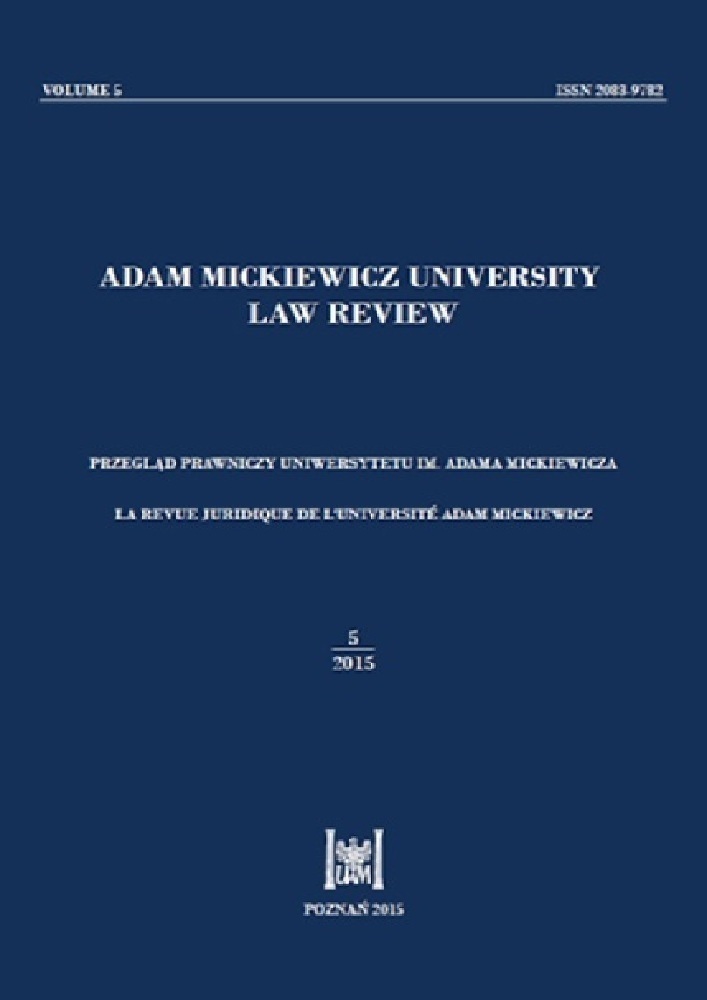Abstract
The history of consensual litigation in Polish criminal proceedings dates back to the 1990s. It is based on the assumption that the participants in the proceedings will come to an agreement on the resolution of the conflict, whichwill then be accepted by the court. This solution was most popular between 2010 and 2015. Since 2016, however, a change in attitudes towards consensual modes has been very noticeable. While the consensual method speeds upcriminal proceedings, opponents point to shortcomings - there are even calls to abandon their use in Poland. In the Federal Republic of Germany, on the otherhand, informal procedural agreements, called Absprachen, existed for several decades, and these agreements accelerated the course of proceedings. However, it was only decided to regulate this issue after several decades. In this article, I will characterise the reasons for the introduction and development of procedural agreements in the Republic of Poland and in the Federal Republic of Germany.
References
Beulke, Werner. Strafprozessrecht. C.F. Müller, 1994.
Dudka, Katarzyna, ed. Kodeks postępowania karnego. Komentarz. Wolters Kluwer, 2023.
Dudka, Katarzyna, and Hanna Paluszkiewicz. Postępowanie karne. Wolters Kluwer, 2022.
Hofmański, Piotr, and Stanisław Waltoś. Proces karny. Zarys system. Wolters Kluwer, 2023.
Jankowski, Michał, and Andrzej Ważny. “Instytucja dobrowolnego poddania się karze (art. 387 k.p.k.) i skazania bez rozprawy (art. 335 k.p.k.) w świetle praktyki. Rezultaty badań ogólnopolskich.” Prawo w Działaniu, no. 3(2008): 119–51.
Karlik, Piotr. Postępowanie konsensualne i szczególne w procesie karnym. Praktyczny przewodnik ze wzorami pism. Wolters Kluwer Polska, 2017.
Karlik, Piotr. “Postępowania szczególne.” In Polski proces karny, edited by Paweł Wiliński. Wolters Kluwer Polska, 2023.
Kulesza, Cezary, ed. Ocena funkcjonowania porozumień procesowych w praktyce wymiaru sprawiedliwości. Oficyna a Wolters Kluwer business, 2009.
Kulesza, Cezary. “Porozumienia procesowe w europejskich systemach wymiaru sprawiedliwości.” In Porozumienia karnoprocesowe w praktyce wymiaru sprawiedliwości, edited by Cezary Kulesza. „Temida 2,” Wydawnictwo Stowarzyszenia Absolwentów Wydziału Prawa Uniwersytetu w Białymstoku, 2010.
Kühne, Hans-Heiner. Strafprozessrecht. Eine systematische Darstellung des deutschen und europäischen Strafverfahrensrechts. C.F. Müller, 2009.
Malicka, Anna. “Koncepcja porozumienia w polskim postępowaniu karnym.” Wrocławskie Studia Erazmiańskie. Zeszyty Studenckie, no. 1(2008): 176–95.
Mierzwińska-Lorencka, Joanna. Kodeks karny. Kodeks postępowania karnego. Podsumowanie zmian 2023. Wolters Kluwer, 2024.
Niemöller, Martin, Reinhold Schlothauer, and Hans-Joachim Wieder. Gesetz zur Verständigung im Strafverfahren. C.H. Beck, 2009.
Peters, Julia. Urteilsabsprachen im Strafprozess. Die deutsche Regelung im Vergleich mit Entwicklungen in England & Wales, Frankreich und Polen. Universitätsverlag Göttingen, 2011. DOI: https://doi.org/10.17875/gup2011-130
Rönnau, Thomas. Die Absprache im Strafprozeß. Nomos, 1990.
Saal, Agnes. Absprachen im deutschen und polnischen Strafprozess. Eine rechts vergleichende Darstellung des Konsensualverfahrens. Peter Lang, 2009.
Sauer, Dirk, and Sebastian Münkel. Absprachen im Strafprozess. C.F. Müller, 2009.
Schünemann, Bernd. Strafprozessuale Absprachen in Deutschland. Der Rechtsstaat auf dem Weg in die “Bananenrepublik”? Roderer Verlag, 2005.
Skorupka, Jerzy, ed. Proces karny. Wolters Kluwer Polska, 2022.
Sowiński, Piotr K. “Kształtowanie się dobrowolnego poddania się karze w trybie 338a i 387 k.p.k. Kilka uwag na tle zmian 1997–2016.” Zeszyty Naukowe Uniwersytetu Rzeszowskiego, no. 102(2018): 229–43. DOI: https://doi.org/10.15584/znurprawo.2018.23.17
Stefański, Ryszard A., and Stanisław Zabłocki, eds. Kodeks postępowania karnego. Tom 3. Komentarz do art. 297–424. Wolters Kluwer Polska, 2021.
Steinborn, Sławomir. Porozumienia w polskim procesie karnym: skazanie bez rozprawy i dobrowolne poddanie się odpowiedzialności karnej. Kantor Wydawniczy „Zakamycze,” 2005.
Świecki, Dariusz, ed. Kodeks postępowania karnego. Komentarz, Vol. 1: Art. 1–424. Wolters Kluwer, 2024.
Świecki, Dariusz. “Ograniczenie podstaw odwoławczych do wniesienia apelacji w trybach konsensualnych (art. 447 § 5 k.p.k.).” Przegląd Sądowy, no. 9(2019): 23–33.
Thaman, Stephen C. “Plea Bargaining, Negotiating Confessions and Consensual Resolution of Criminal Cases.” Electronic Journal of Comparative Law 11, no. 3(2007).
Tscherwinka, Ralf. Absprachen im Strafprozeß. Peter Lang AG International Academic Publishers, 1995.
Urbanowicz, Katarzyna. “Formy konsensualizmu procesowego w świetle ostatnich nowelizacji Kodeksu postępowania karnego.” Zeszyt Studencki Kół Naukowych Wydziału Prawa i Administracji UAM, no. 6(2016): 257–74.
Waltoś, Stanisław. “Nowe instytucje w kodeksie postępowania karnego z 1997 roku.” Państwo i Prawo, no. 8(1997): 25–40.
Waltoś, Stanisław. “Porozumienia w polskim procesie karnym de lege lata i de lege ferenda.” Państwo i Prawo, no. 7(1992): 36–48.
Weichbrodt, Korinna. Das Konsensprinzip strafprozessualer Absprachen. Duncker & Humblot, 2006.
Weigend, Thomas. “Urteilsabsprachen in Deutschland.” In Nauki penalne wobec problemów współczesnej przestępczości. Księga jubileuszowa z okazji 70. rocznicy urodzin Profesora Andrzeja Gaberle, edited by Krzysztof Krajewski. Oficyna a Wolters Kluwer business, 2007.
License
Copyright (c) 2024 Klaudia Modrzejewska

This work is licensed under a Creative Commons Attribution 4.0 International License.

